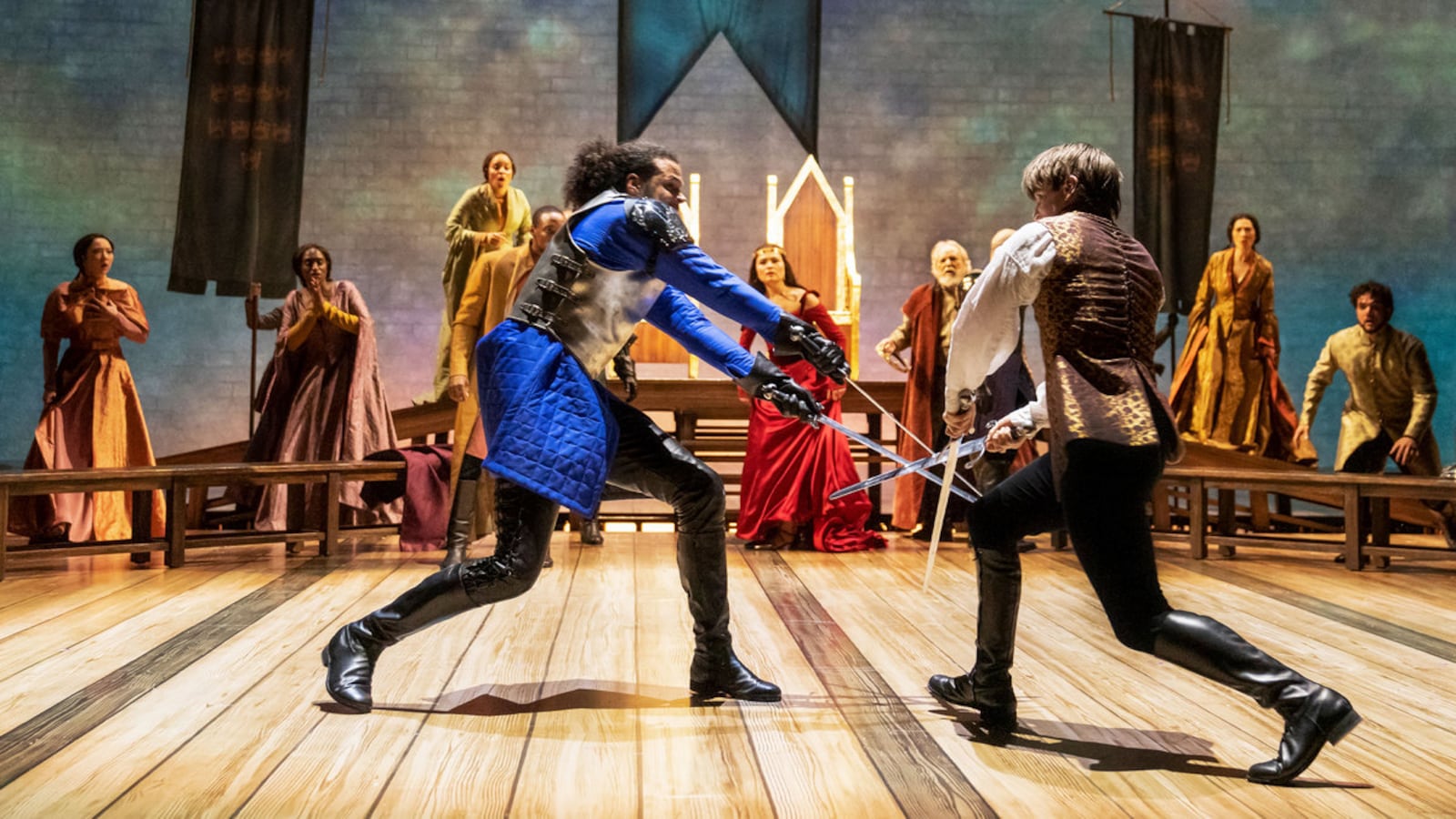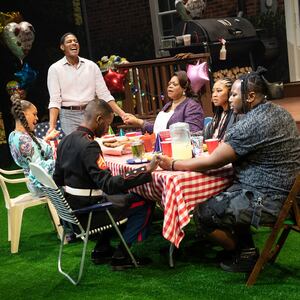Camelot (Lincoln Center, Vivian Beaumont, booking to June 25) begins with a deceptive meet-cute. Guenevere (Phillipa Soo) is in disguise as she overhears the revelation of the true identity of a man she has recently been demanding assistance from. She has made it clear to the man that she must get out of England, very much against the idea of an arranged marriage with that country’s King Arthur (Tony-winning The Inheritance actor Andrew Burnap).
Then we hear some guards talking to the man she has been talking to. It’s King Arthur. Guenevere visibly wilts under her hooded disguise. She is briefly mortified. The surreally fascinating thing in this Broadway revival of Camelot, directed by Bartlett Sher, is watching this meet-cute curdle into a stultifying, grizzly marriage of two characters with zero chemistry, and then watching that relationship implode entirely—and not really care about its destruction, because this new Camelot doesn’t make us care. Even the swaggering introduction of romantic fly-in-the-ointment Lancelot du Lac (Jordan Donica) doesn’t inject any life.
It feels as if this Camelot—with book by Aaron Sorkin, based on Alan Jay Lerner’s original; its actors lost and unmoored on the cavernously bare stage of Lincoln Center’s Vivian Beaumont Theater—isn’t sure what to focus on, beached between its sermonizing about Arthur wanting to make a Round Table of knights not-fighting and generally being standard-bearers for a new just fairness (“might for right”), and then the Arthur-Guenevere-Lancelot love triangle which is bizarrely dull and tension-free. At almost three hours on a spartan stage, it grinds into a numbingly boring show.
A friend who saw it said some of his tears in the final scene, where Arthur talks to a young knight Tom of Warwick (Cameron McKinnon) about holding dear the promise of what Camelot meant—a nation of virtuous deeds, justice, and idealistic promise—elicited emotion because “Camelot” for Americans is synonymous with John and Jackie Kennedy, and what that moment in history represented for this country.
For him, the name of the musical long ago bled into its wider political-cultural definition. Certainly this production emphasizes the power of idealism set against the sullying forces of chaos-bringers and dangerous liars that today’s audiences are all-too familiar with, but—like much in the show—the point feels lost.
This Camelot is partially saved from disaster by Kimberly Grigsby’s music direction, and the wonderful 30-piece orchestra who bring a lovely, resonant richness to Lerner and Frederick Loewe’s lyrics and music. If you have delighted in past productions and/or cast albums, Robert Russell Bennett and Philip J. Lang’s orchestrations are well-served here. Sadly, the many other faults of the show overshadow the music.
Soo and Donica have beautiful voices, and their characters’ well-known songs—“The Simple Joys of Maidenhood,” “C’est Moi,” If Ever I Would Leave You,” “I Loved You Once in Silence”—are welcome islands of tuneful professionalism, but not enough to anchor a show that feels lost, with actors having to walk what feels like miles to arrive or leave, somewhat diminishing the impact of dramatic exits.
What are the stakes? You care not a jot if Arthur is successful in his mission to form a civilized Round Table, as a symbol of a country devoted to the rule of law and fair play, because his mission is stated over and over again with little staged conviction or manifestation. Is it a philosophical musing? Is it just a challenge for the boorish knights we see?
Also: Does Arthur care that much—about his marriage, about chivalry, about running the country? He says he does, but he seems almost as absent-minded as his paternalistic mentors, Merlin and then Pellinore (both played with bumbling charm by Dakin Matthews). While Arthur tells the story of sword pulled from stone, and Excalibur is glintingly unsheathed, this stern-feeling show itself feels denuded of myth and magic.

Phillipa Soo, left, and Andrew Burnap in 'Camelot.'
Joan MarcusBurnap’s Arthur and Soo’s Guenevere seem not just mismatched, but in different shows in different timezones. There’s a key moment where she recoils at the description of their marriage as a “business arrangement,” but this seems a perfectly adequate and fair summation—and it is not one, until now, her character has shown any sign of straining against. The pair are written and played as companionable strategists rather than passionate lovers, with Arthur—first sighted up a tree, represented by scaffolding on the side of the theater—seeming more impish, questioning lost boy than king.
We do not feel the passion of his desire to make his nation fair, and his knights unimpeachably upstanding symbols of the same. (And surely such a big stage can accommodate an actual round table?!) Whether he is sword-fighting Lancelot, or holding forth, Arthur lacks charisma. He could be an office manager fretting over paperclip supplies, rather than the great moral questions facing a statesman shepherding a nation.
And so, you search for the sizzle between Lancelot and Guenevere, but they are the most chaste and dull of illicit lovers. Lancelot’s early swagger is soon tamed into a doe-eyed loyalty to the crown and “Jenny” (his name for Guenevere). The chilly, empty stage doesn’t help focus their passions, or our attentions on them. Jolts of stage-filling energy, like Guenevere and the ensemble’s “Lusty Month of May”—complete with maypole, colorful ribbons, and bubbly dancing—feel beamed in from another show.
Sorkin and the cast feel more comfortable with glancing pieces of comedy and wordplay than the book’s weightier concerns. The problem with the love triangle is that you’re not rooting for any combination of couple; for different reasons Guenevere and Arthur kind of work, and kind of don’t, and Guenevere and Lancelot kind of work (mainly because of the hot sex they briefly enact in front of us) and kind of don’t. A sword fight between Arthur and Lancelot feels both predictable and inconclusive, rather than thrilling.

Andrew Burnap in 'Camelot.'
Joan MarcusIn act two, the introduction of the Arthur’s secret son Mordred (Taylor Trensch) could come with placards encouraging the audience to boo and hiss, such is the pantomime villainy of the young man who manipulates Guenevere to cheat on Arthur with Lancelot, and try to steal the crown for himself by fomenting discord with the knights. His songs, “The Seven Deadly Virtues” and—with the aggro’d up knights—“Fie on Goodness,” sound like squawking rants, rather than boisterously malevolent, philosophically weighty counterpoints to Arthur’s ideal of Camelot.
Morgan Le Fey (Marilee Talkington) is here depicted as Mordred’s mother, and more morally ambiguous than her son, with more portentous things to say about power and corruption. (At least the stage projections of gnarled branches, created by 59 Projections, come into their own to give the show a striking dash of visual surprise here.) Like much in the production, it is hard to know what to make of her role.
The story hobbles towards its end, and the specter of war—the very thing Arthur wanted to avoid—between England and France resulting from Lancelot and Guenevere’s illicit passion. And yet, nothing is really said about that between Arthur and Guenevere, no argument, nothing. Their final goodbye is sad, but also not that sad, because they didn’t seem that great together anyway. Just like all the blah about power, goodness, and justice, it is a final puzzle swallowed up by the huge empty stage.






